Name of game, creator, platform:
Skribbl.io is an online multiplayer Pictionary-like game created by ticedev. It can be played in any browser by accessing https://skribbl.io.
Target audience (as best you can discover from research or the games messaging):
Based on the game’s easy access and simple game mechanics, the target audience appears to be anyone that has access to a computer. Players can make private lobbies to play with friends and family, or join a public lobby to play with strangers.
Formal elements of the game: how many players? What actions can players take? How do rounds work? Do they do anything interesting with player relationships/objectives/resources?
The game can be played with 2-12 players. The main objective of the game is to gain the most points by the end of the game. Players take turns being the active artist, where they are given three words from which to pick a secret word to draw, while the remaining players try to guess the word based on the artist’s drawing before a timer runs out. They have access to some basic colors, an eraser, a pen, and a fill tool. Players gain points for guessing the secret word earlier than others, as well as having all players guess the word they’re drawing. However, if the timer runs out and some people haven’t guessed the word, they will gain no points, and the artist will also gain fewer points. A round consists of each player drawing once, and the host of the lobby can choose how many rounds to play and how long the draw timer will be.
Because of the way points are distributed, the artist is incentivized to draw well so their word is guessed quickly, and by as many players as possible. This makes it so that if one player doesn’t get the word while everyone else does, the artist can try to cater their drawing to that player.
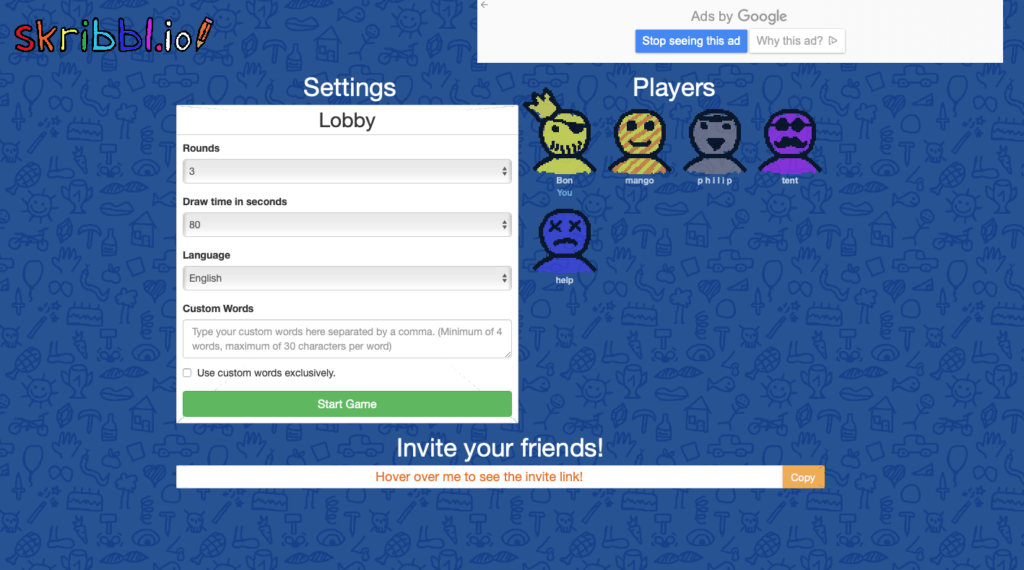
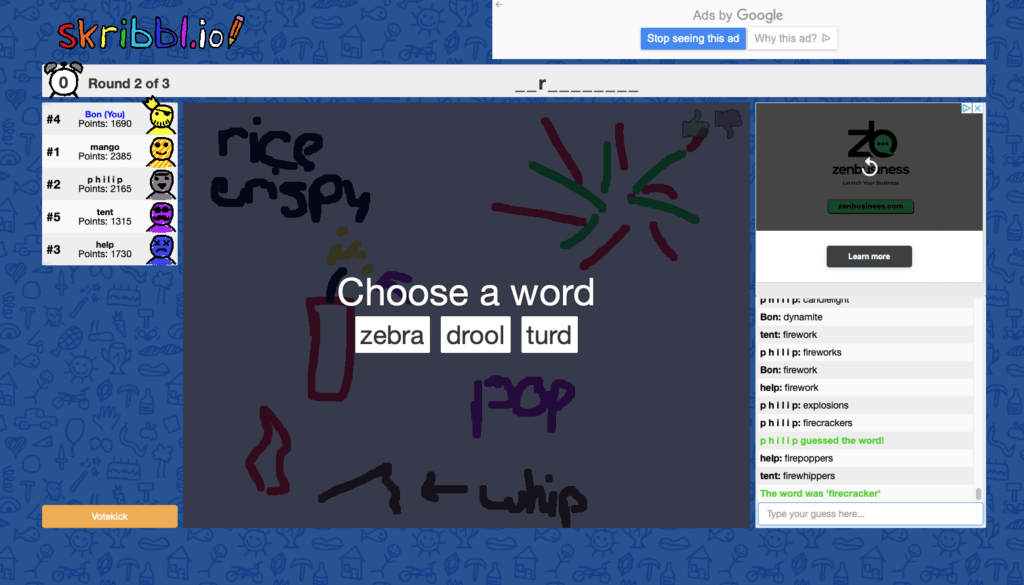
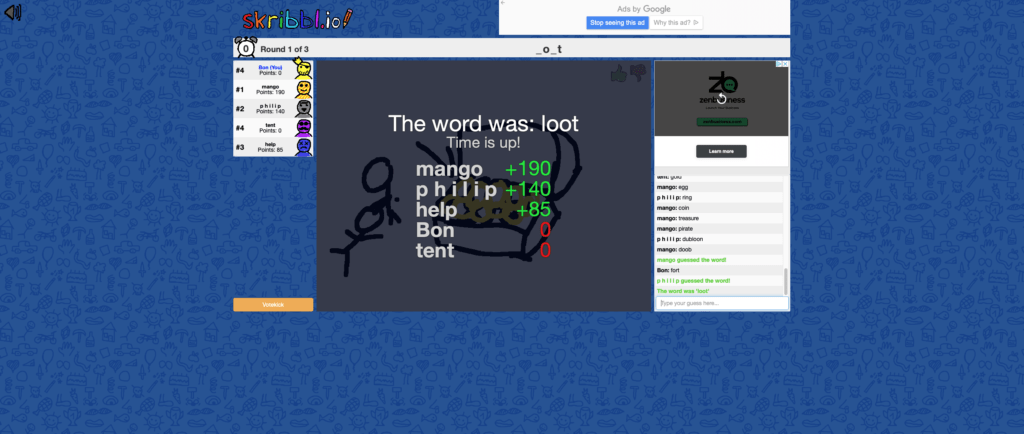
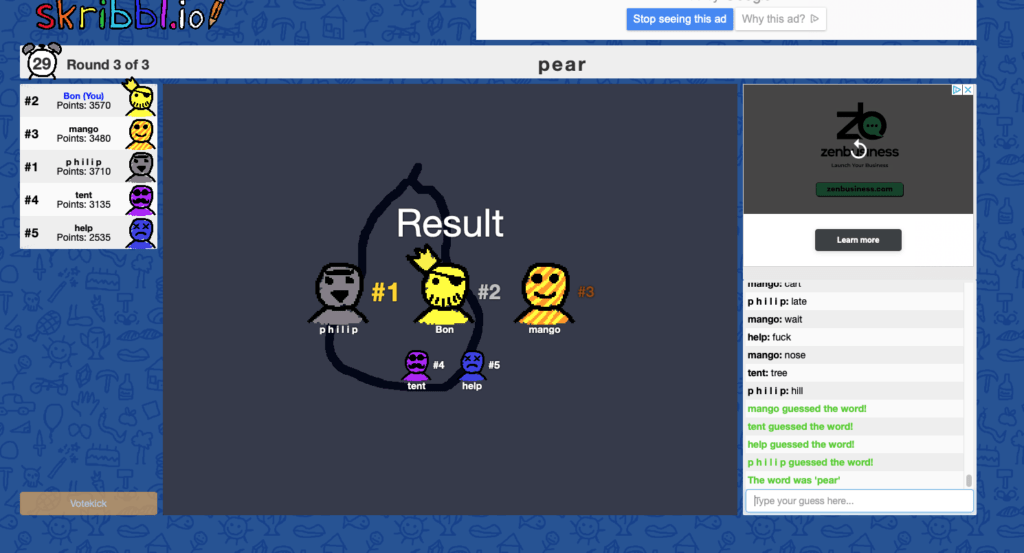
What kind of fun? How do the elements of the game lead it to be fun/compelling?
Most of the fun comes from judging other people’s skills in expressing the word through their art. Sometimes we all laughed together at how bad a drawing was, or marveled at a clever way of portraying some idea. The point and guessing systems encourage a dynamic of competition, while being the artist requires the utmost cooperation with the other players. I believe that the most fun was gained through subversion of expectation, where the drawing doesn’t make sense at first but then suddenly comes together with a single stroke.
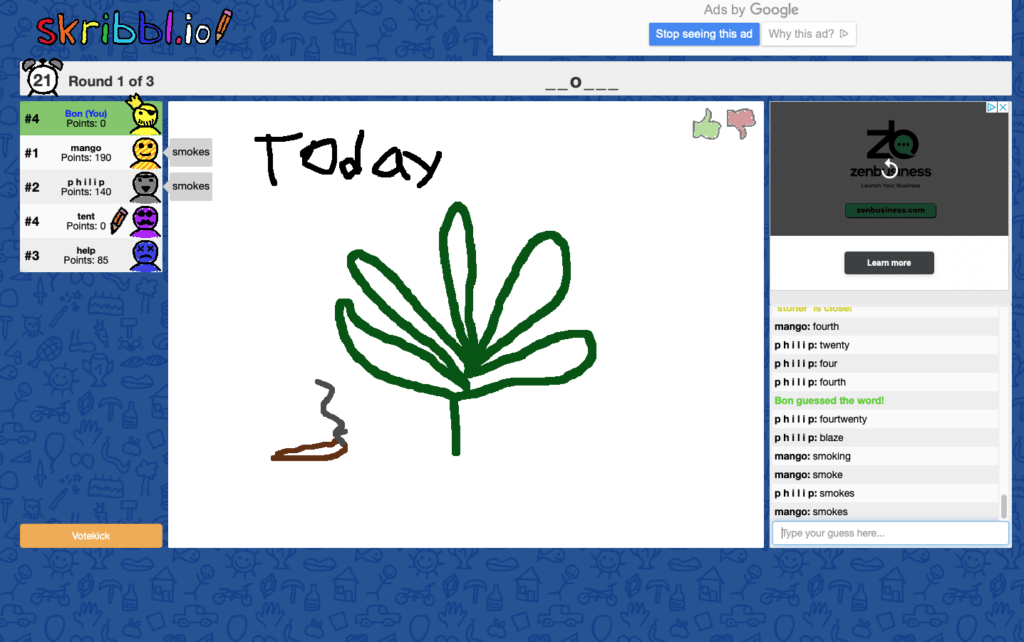
Why does this game work? How could it be improved?
Part of why the game works and it’s so easy to play is because everything is handled by the website. Players don’t have to worry about picking words, whose turn it is, or keeping score, and can instead focus on drawing and guessing, the interactive and fun parts of the game. Additionally, players can play from anywhere in the world, as long as they have an internet connection an access to a computer. This is perhaps skribbl.io’s biggest pro, the ability to connect with players over far distances.
One way I think the game could be improved is by assigning longer or harder words a higher score for being drawn and guessed. Currently, there is no real incentive to draw really difficult words if there are easier ones available. By giving a point incentive, players could consider a high-risk high-reward strategy if they so choose, maybe if they’re behind on points.
Compare the game you chose to other games in its genre. What differentiates it from the other games? Is it better/worse? How so?
Perhaps the best game to compare skribbl.io to is its progenitor: Pictionary. Usually played in teams, Pictionary is also a drawing game where players must guess a secret word being drawn by the artist. I would consider skribbl.io better in several regards: first, the drawing tools are far more robust (fill tool, multiple colors). Secondly, players don’t have to worry about whose turn it is, secret word distribution, who guessed the word first, and keeping track of points. I’ve seen many a game of pictionary devolve into arguments between teams over which team guessed the secret word first, which is something that’s handled automatically in skribbl.io. However, Pictionary does have the edge in that players can play in teams, which has not been implemented in skribbl.io.
This isn’t exactly an advantage or disadvantage, but it is noteworthy. Pictionary can only be played in person, but arguable its interpersonal reactions are far more valuable as compared to skribbl.io’s available interactions through chat. More often then not, players will be looking at their screens instead of each other.
How vulnerable do you need to get?
Vulnerability in skribbl.io depends a lot on who you’re playing with. While playing with close friends, we could make inside jokes and references that strangers wouldn’t understand. Skribbl.io also has the ability to use custom words, so sometimes we put the players’ names in or certain references that only we would understand. In summary, it’s not necessary to be too vulnerable in skribbl.io, but you can if you’d like with a group of players that you’re close to.



